
1
Fifth stage
Medicine
Lec-2
د. الهام الجماس
4/10/2015
Introduction to Psychotic Illnesses
Psychosis - definition:
Mental disorder
in which the thoughts, feelings, affective response, ability to recognise reality
and ability to communicate and relate to others are
sufficiently impaired to interfere grossly with the capacity to deal with reality;
the characteristics of psychosis are impaired reality testing, hallucinations,
delusions and illusions.
Contents
Psychotic symptoms
Delusional mood
Hallucinations
Delusions
First-rank symptoms
“Psychotic illnesses”
Schizophrenia
Delusional disorders
Conditions involving psychotic symptoms
Mania / psychotic depression
Drug-induced psychoses
Organic psychoses
Delirium / delirium tremens (DTs)
What do I Really Have to Know?
Think ORGANIC!
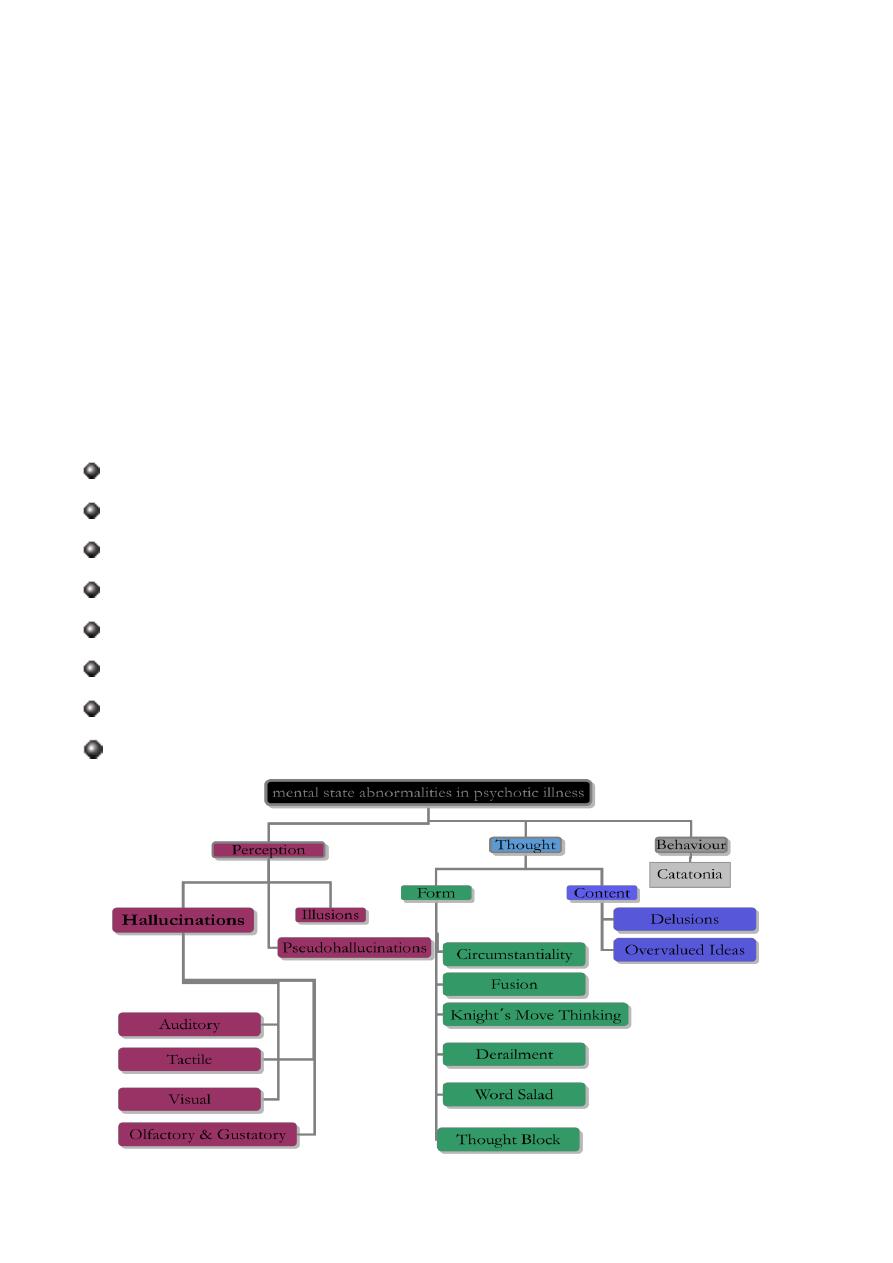
2
Oxygenation, Glucose, Electrolyte disturbance, endocrine
Toxicity – iatrogenic, self-inflicted, accidental
Drugs & alcohol
Cerebral pathology
Define:
Delusion
Hallucination (vs illusion)
ICD-10
A diagnostic heirarchy
F0- Organic
F1- Substance-related
F20s - Schizophrenia… & delusional disorders
F3- Mood [affective] disorders
F4- neurotic, stress-related & somatoform dis.
F5- physiological.. (inc eating disorders)
F6- personality disorders…
F7- mental retardation...
etc

3
Delusions – definition
“a false, unshakeable idea or belief which is out of keeping with the patient’s
educational, cultural and social background” – Simms
* we can never understand how they arrived at the belief – defies normal logic *
BUT
Need not be totally unshakeable – cognitive therapy for delusions; many
patients have some insight
Need not be false (eg delusional jealousy, then discover partner actually IS
unfaithful)
Wrongly ARRIVED at belief
Primary Delusion – ‘out of the blue’
Secondary Delusion – arises out of… eg. hallucination
Overvalued idea
A preoccupation which can come to dominate (& ruin) a person’s life
but you can understand where it came from
and it’s sort of believable
eg body image distortion in anorexia nervosa
eg hypochondriacal disorder
eg patient fears he has a brain tumour
but is briefly reassured by the latest test
Delusions of…
Grandeur / ability
Paranoia
Reference
Persecution
Control
Infestation

4
Love / jealousy
Misidentification
Nihilism
Delusions – examples :
“I am the son of George W Bush …and a Somali woman. They were on holiday there and left
me behind.” ( grandeur )
“I have a microchip in my brain which transmits my thoughts to MI5.” (control )
“My family are poisoning my food – it tastes funny” (persecution)
“They’re making a TV programme about me – I keep seeing my name in the newspaper.”
(reference )
Persistent Delusional Disorders (F22)
Delusional disorder (F22.0) – including:
Persecutory delusions
delusional jealousy;
De Clérambault’s syndrome – “erotomania”
Induced delusional disorder (folie a deux) (F24)
Delusion shared by people with close emotional links
Only one person suffers from a genuine psychotic disorder
The other person’s delusion disappears when they are separated
Delusional dysmorphophobia (F22.8)
Paranoia querulans (F22.8)
Delusional percept / “primary delusion” (out of the blue)
“A young Irishman was at breakfast with two fellow-lodgers. He felt a sense of unease,
that something frightening was going to happen.
One of the lodgers pushed the salt cellar towards him (he appreciated at the same time
that this was an ordinary salt cellar and his friend's intention was innocent).
Almost before the salt cellar reached him he knew he must return home, to greet the
Pope, who is visiting Ireland to see his family.”

5
From: Simms “symptoms in the mind”
‘Delusional mood’ – a feeling that something’s not right:
Imagine :
You’ve bumped someone’s car in a car park. There’s no damage, so you drive off
quickly!
Your phone rings in the middle of the night but you miss the call and the number is
unknown…
What emotions do you feel?
What goes through your mind?
Who was phoning you?
The next day, you’re still thinking about it and you receive an envelope with a
government crest on it…
What emotions now?
What goes through your mind before you open it?
Supposing, in your nervous state, you read it wrong…?
How to approach a delusional patient :
Empathise (but don’t patronise)
Test the intensity of the belief
but don’t be confrontational
Ask them ‘could there be an alternative explanation?’
What have they done about their belief?
(do they believe you’re a real medical student?)
Look up examples of how to phrase your questions
Present State Examination
Other delusional syndromes :
Fregoli’s delusion
My persecutor takes on the form of different people…
But I KNOW it’s still him!
Schizophrenia / stroke = delusional misidentification
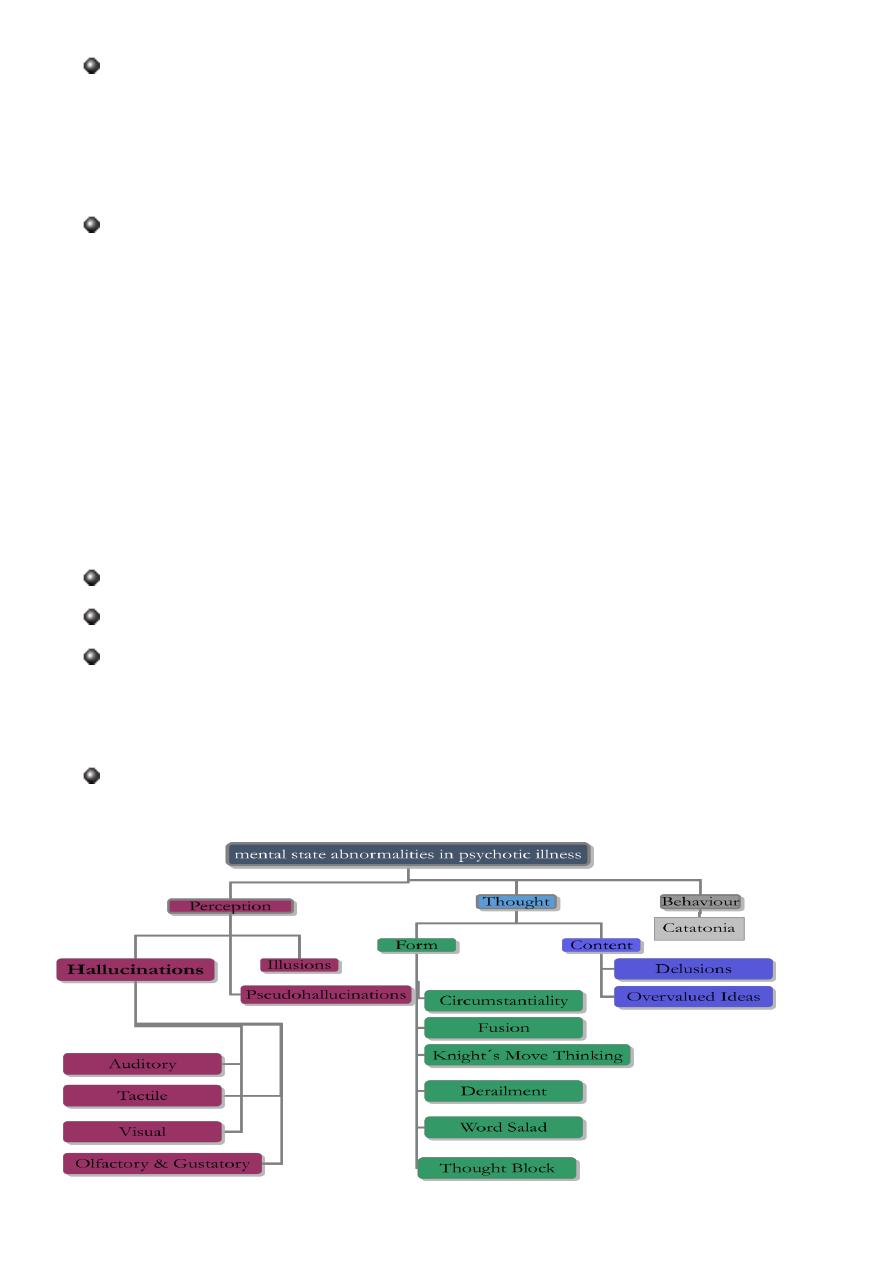
6
Cotard syndrome
Nihilistic delusions, esp. in psychotic depression
“I’ve got no blood / bowels / breath / money”
“I’m dead / rotting from inside”
Capgras’ delusion
A 74-year old married housewife believed that her husband had been replaced
by another unrelated man. She refused to sleep with the imposter, locked her
bedroom at night, asked her son for a gun, and finally fought with the police
when attempts were made to hospitalize her. She easily recognized other
family members and would misidentify her husband only.
Dementia / stroke = delusional misidentification
This case is taken from a report by Passer and Warnock
De Clérambault’s syndrome
“erotomania”
usually in women
convinced that a man
usually older, of higher status
eg the consultant
is in love with her
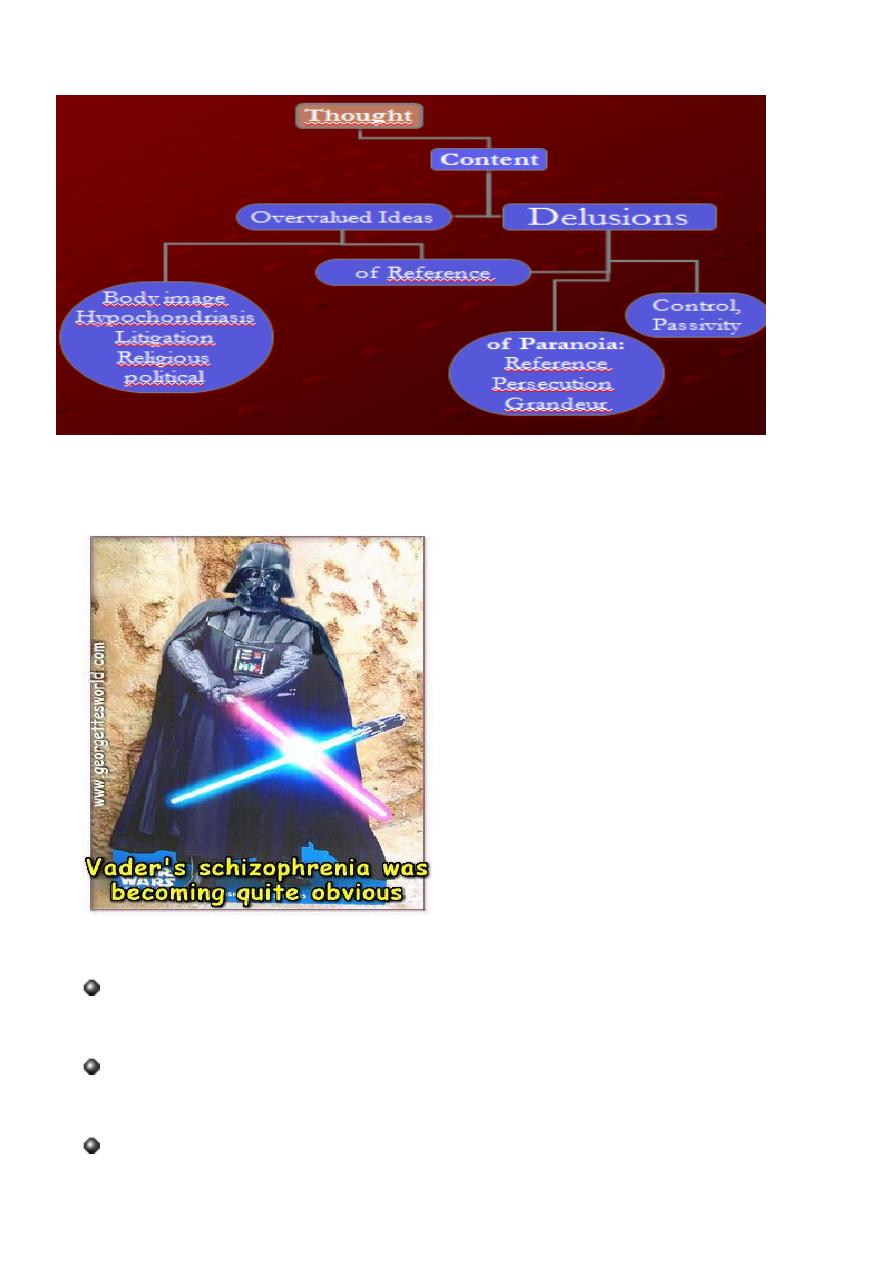
7
Schizophrenia
Myths & Misconceptions
‘Schizophrenia’ does literally mean ‘separated mind’
Greek – applied by Bleuler in 1911
BUT is nothing to do with ‘split personality’
…let alone ‘multiple personality’ (very rare)
HAS to do with the brain’s functions separating
eg. You hear a voice but don’t recognise it’s come from your own mind
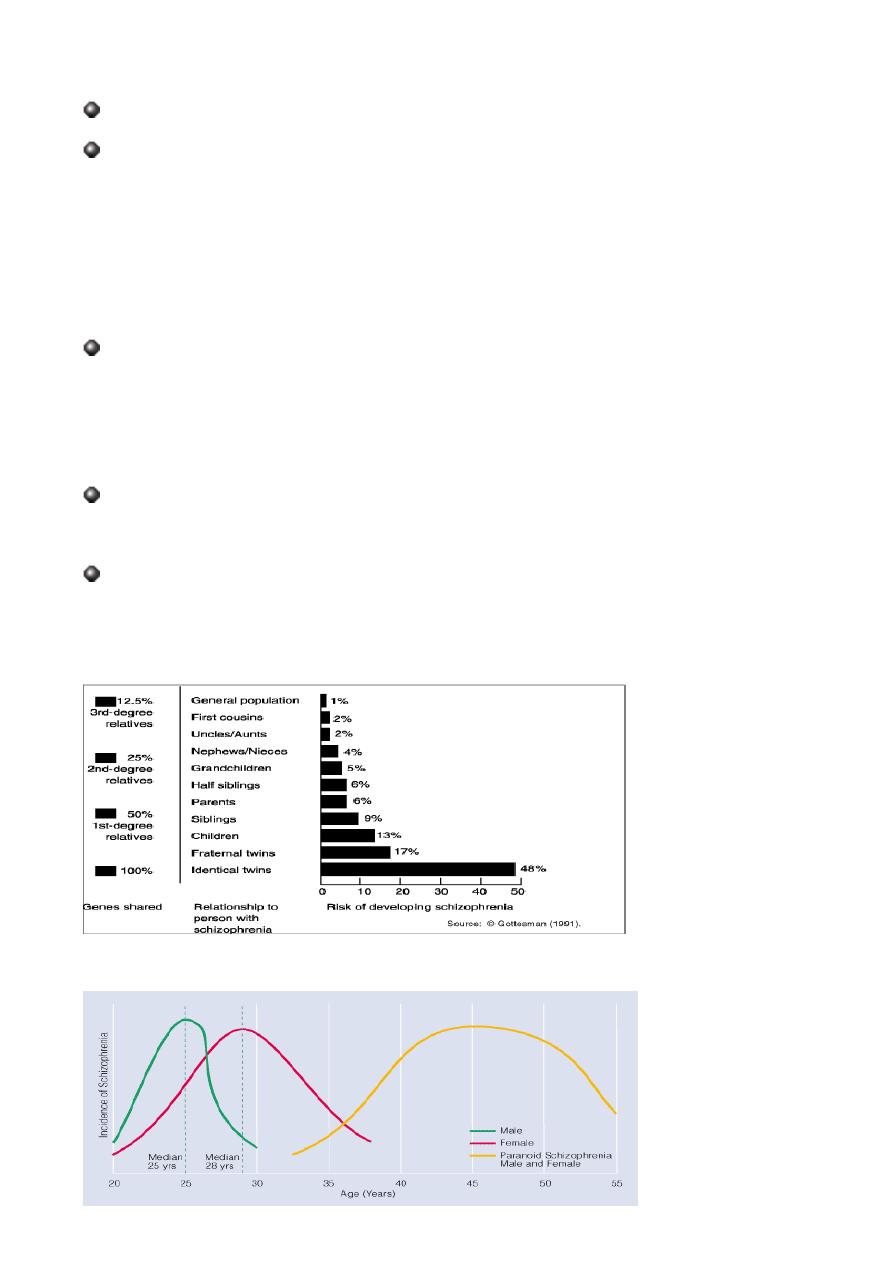
8
Definition of Schizophrenia
a “severe and enduring mental illness”
A clinical syndrome
“a collection of features which tend to occur together”
Refined over last 200 years or so
Recognised pattern of outcome
Same methods of treatment
Biological basis; severe psychosocial consequences
No definitive cause or mechanism yet identified (multifactorial – see PBL
lecture)
Neurochemical imbalance
‘reality testing’ and ‘theory of mind’ defective
+ loss of ‘ego boundaries’ – (what is Me and what is Outside)
BUT there is still no single concise definition!
Heritable Risk
Age of Onset – Bimodal Distribution
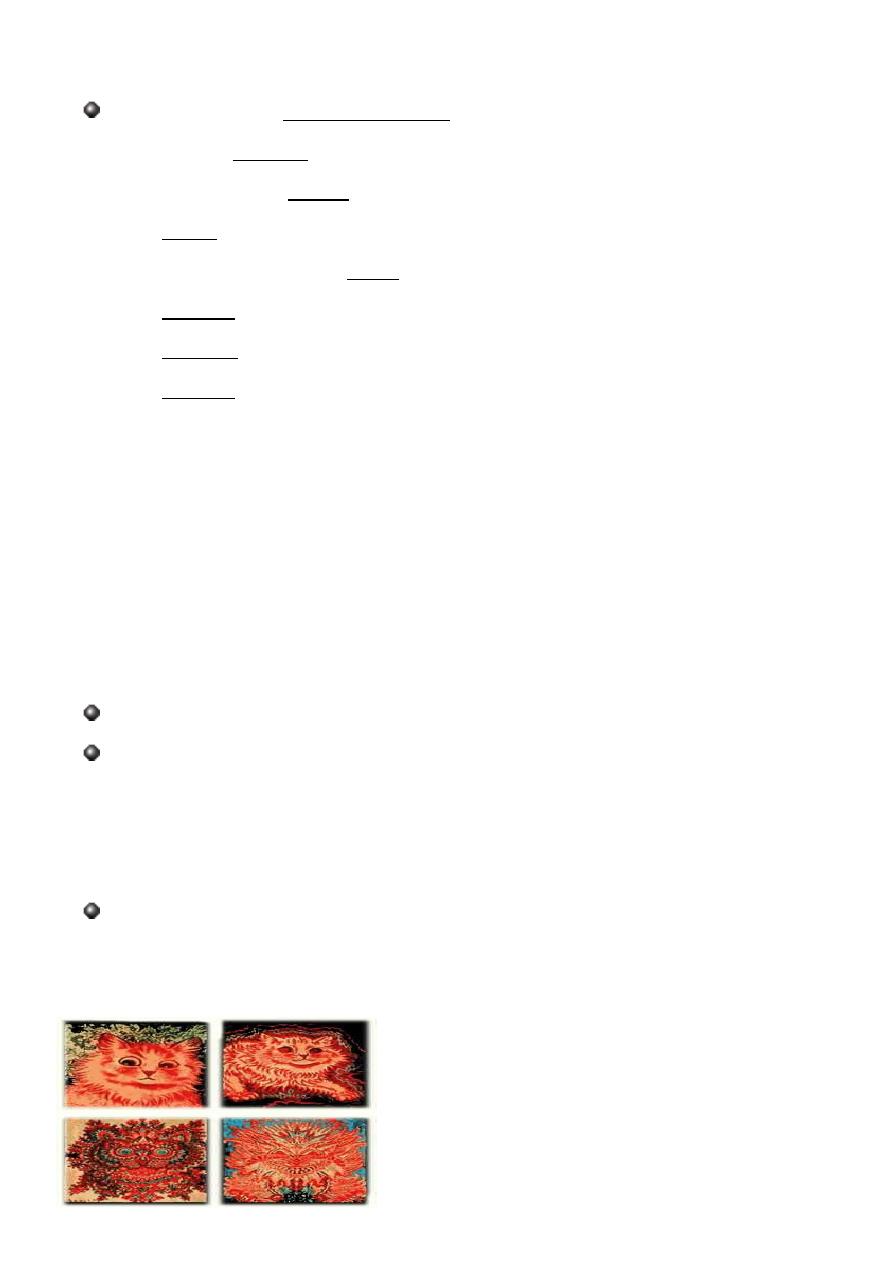
9
1
st
Rank symptoms
1950’s - Schneider’s 1st Rank Symptoms:
1. Primary Delusion = ‘delusional percept’
2. Own thoughts spoken aloud = ‘thought echo’
3. Voices arguing or discussing
4. running commentary voices
5. thought withdrawal and/or thought block
6. Thought insertion
7. thought broadcasting (others are thinking it at the same time as you)
8. Made to feel… ‘passivity of affect’
9. Made to want… ‘passivity of impulse’
10. Made to do… ‘passivity of volition’
11. Done to my body ‘somatic passivity’ eg probed by aliens
12. Some may occur in illnesses other than schizophrenia eg mania
Illusion
Incorrect perception of a real stimulus (in any modality)
Usually non-pathological
Bush looks like a killer in the dark
“cocktail party” illusion: hearing your name across a noisy room
A stray hair may feel like a spider on the neck
BUT illusions occur in psychosis
eg girl complains her face is melting when she looks in mirror
Paintings by artist with worsening psychosis – perceptual disturbances

11
Hallucination
A perception, which feels real, but has no real stimulus
usually abnormal, especially when persistent
But occasional hallucinations are more common than we thought! - 10% of
British population, at some time
Modalities:
Auditory
heard as if coming from outwith your head (including from another part
of the body) cf pseudohallucinations
Visual (more indicative of organic pathology!)
Somatic / Hygric (visceral) / Sexual
Gustatory
Olfactory
Hallucinations 2
Non-pathological:
Hypnagogic (going off to sleep)
Hypnopompic (waking up)
When it’s NOT a hallucination :
Illusion = misperception of a REAL stimulus
Daydream = imagery
Pseudohallucination
Occurs in inner subjective space
eg voices INSIDE your head
May have quality of your own thoughts
Distressed patients not interested in this distinction!
Ideas of reference :
On a spectrum
I think people on the bus are looking at me => =>

11
The news is about my life! It means I’m a paedophile. Don’t you believe me?
Audible Thoughts
= Gedankenlautwerden, echo de pensees
The patient may hear people
repeating his thoughts out loud just after he has thought them,
answering his thoughts,
saying aloud what he is about to think so that his thoughts repeat the voices.
He often becomes very upset ill the gross intrusion into his privacy and
concerned that he cannot maintain con control of any part of himself, not even
his thoughts.
A 35 year old painter heard a quiet voice with `an Oxford accent', which he attributed
to the BBC. The volume was slightly lower than that of normal conversation and
could be heard equally well with either ear. He could locate its source at the right
mastoid process. The voice would say, `I can't stand that man, the way he holds his
hand he looks like a poof' . . . He immediately experienced whatever the voice was
saying as his own thoughts, to the exclusion of all other thoughts. When he read the
newspaper the voice would speak aloud whatever his eyes fell on. He had not time to
think of what he was reading before it was uttered aloud.
Simms
voices arguing :
A 24 year old male patient reported hearing voices coming from the nurse's ofice.
The voice, deep in pitch and roughly spoken, repeatedly said,
‘He is a bloody paradox', and another, higher in pitch, said,
'He is that, he should be locked up'.
A female voice occasionally interrupted, saying `He is not - he is a lovely man'.
voices giving a Running Commentary
…just before, during or after the patient's activities.
A housewife heard a voice coming from the house across the road....
The voice went on incessantly in a flat monotone describing everything she was
doing, with an admixture of critical comments.

12
`She is peeling potatoes, got hold of the peeler, she does not want that potato,
she is putting it back, because she thinks it has a knobble like a penis, she has a dirty
mind, she is peeling potatoes, now she is washing them'
Passivity experiences
'I am thinking about my mother, and suddenly my thoughts are sucked out of my mind by a
phrenological vacuum extractor, and there is nothing in my mind, it is empty.
Thought Insertion
‘I look out of the window and I think the garden looks nice and the grass looks cool,
but the thoughts of Chris Evans come into my mind.
There are no other thoughts there, only his....
He treats my mind like a screen and flashes his thoughts onto it like you flash a
picture.’
Thought Broadcasting
Def: whenever your thoughts are accessible to others, eg telepathy, your thoughts on
TV
A 21 year old student said,
“As I think, my thoughts leave my head on a type of mental ticker-tape.
Everyone around has only to pass the tape through their mind and they know my
thoughts.”
Passivity of emotion
A 23 year old female patient reported,
`I cry, tears roll down my cheeks and I look unhappy,
but inside I have a cold anger because they are using me in this way, and it is not me
who is unhappy,
but they are projecting unhappiness onto my brain. They project upon me laughter, for
no reason, and
you have no idea how terrible it is to laugh and look happy and know it is not your, but
their reaction.'
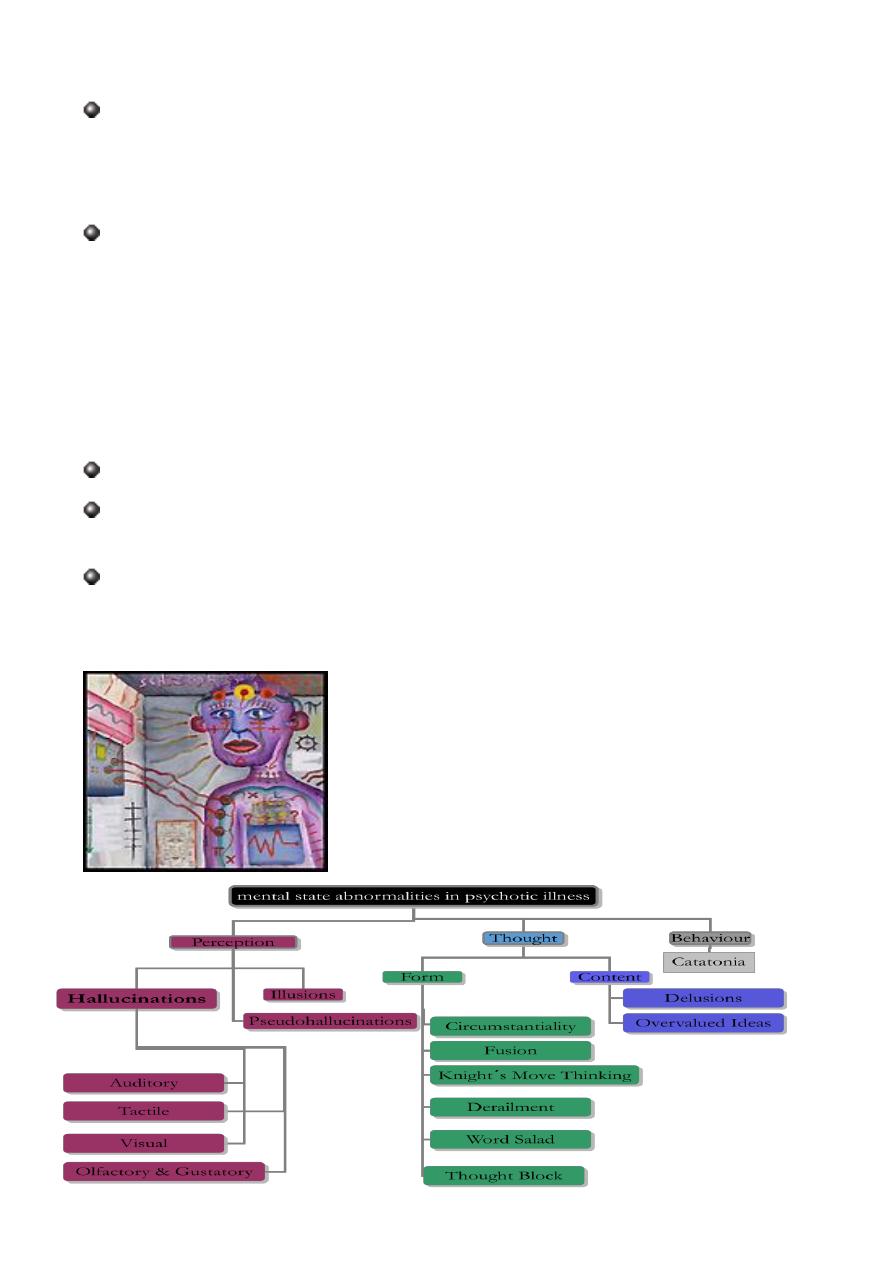
13
Passivity of Impulse
A Jewish woman suffering from schizophrenia said `I feel my hand going up to salute,
and my lips saying "Heil Hitler" ... I don't actually say it ... I have to try very hard to
stop my arm from going up ... they put drugs in my food; that is what makes it
happen.'
A 26 year old engineer emptied the contents of a urine bottle over the ward dinner
trolley. He said, `The sudden impulse came over me and I must do it. It was not my
feeling, it came into me from the X-ray department, that was why I was sent there for
implants yesterday. It was nothing to do with me, they wanted it done. So I picked up
the bottle and poured it in. It seemed all I could do.'
Somatic Passivity
the belief that outside influences are playing on the body
A 38 year old man had jumped from a bedroom window, injuring his right knee which
was very painful.
'The sun-rays are directed by U.S. army satellites in an intense beam which I can feel
entering the centre of my knee and then radiating outwards causing the pain.'
Artist with Sz – delusion of being electronically controlled?

14
Thought Disorder
Circumstantiality – “beating about the bush”
(goal eventually reached but tortuously indirect and over-inclusive)
Knight’s Move Thinking
Illogical jumping between ideas. Listener can’t follow train of thought.
“I can’t go to the zoo, no money. Oh... I have a hat - these members make no
sense, man… What’s the problem?”
NOT the same as Flight Of Ideas, which you CAN follow
Derailment (just losing the plot – goal of speech not reached)
Fusion (themes recur but in odd order, hard to follow)
Thought Block (‘snapping off’ train of thought. No thoughts left)
Differential Diagnosis: Conditions that look like schizophrenia (similar
symptoms)
Organic psychoses –
Temporal Lobe Epilepsy, delirium, delusional disorder, catatonia
substance-induced psychoses –
Cannabis/hallucinogens, stimulants, alcohol (DTs, hallucinosis), etc
“Acute and transient” psychotic disorders
Schizo-affective disorder
Manic episode
Schizotypal disorder
Emotionally unstable personality disorder (can have brief psychotic symptoms)
Trance & possession disorders!
